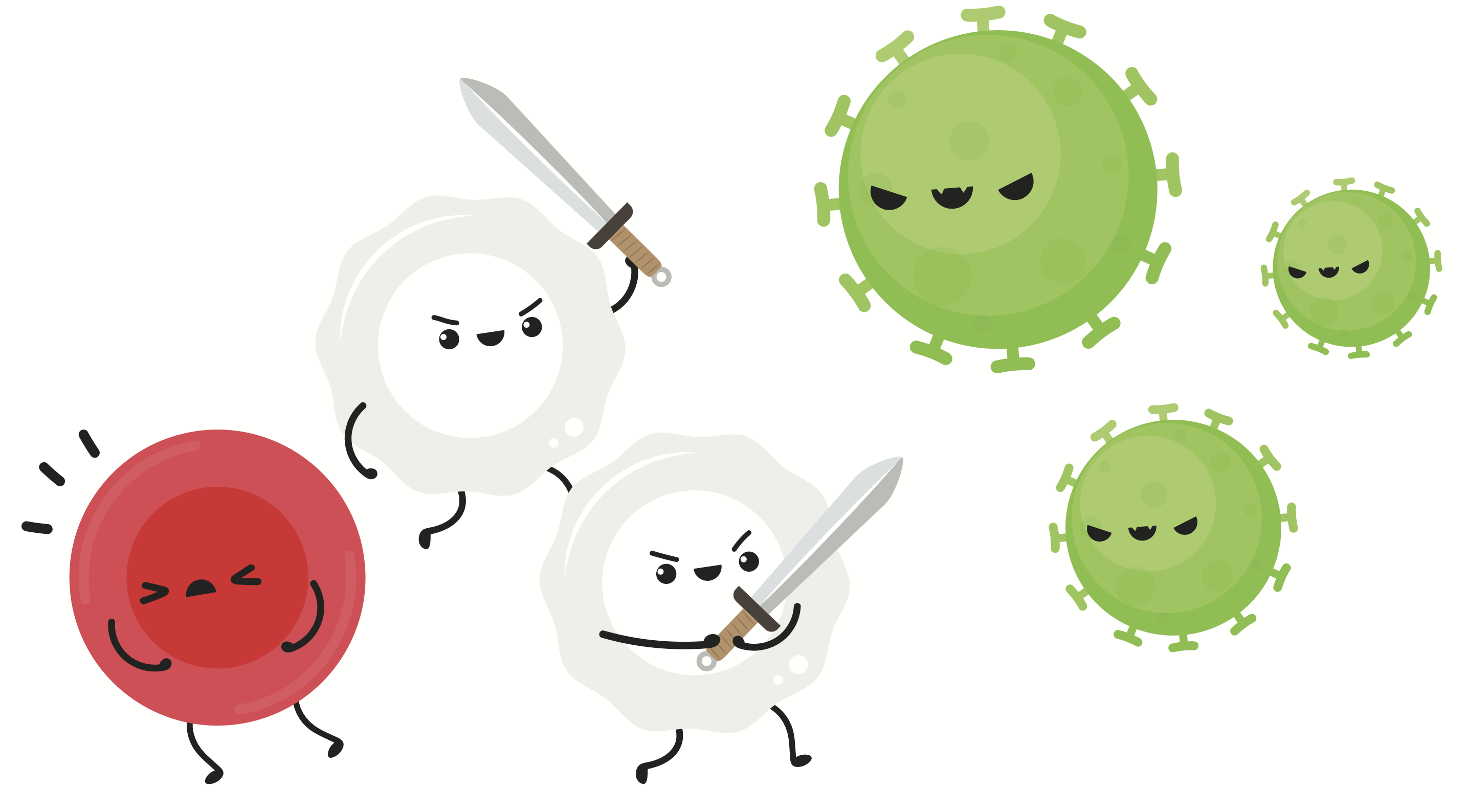What Is the Immune System?
24th Jun 2022
Your immune system works to protect your body from illness or infection. It recognizes damaged cells or germs and attacks them to rid the body of harmful matter. The immune system is what keeps us healthy even when the average person comes in contact with 60,000 germs a day.

Your Immune System and White Blood Cells
White blood cells are the key players of your body’s immune system. Two types of white blood cells, phagocytes and lymphocytes are present in all three types of immunity.
• Innate immunity: Also known as natural immunity and is a general type of protection that everyone is born with.
• Adaptive immunity: Developed when we’re exposed to illnesses or immunized from them by way of vaccines.
• Passive immunity: A type that is borrowed from another source such as a mother’s breast milk containing antibodies.
Phagocytes circulate throughout the body seeking to eliminate bacteria, foreign matter and dying cells by engulfing the particle forming a vacuole to ingest it.
Lymphocytes create a database of invaders and neutralize them. Two types of lymphocytes, B cells and T cells, operate differently.
The B cells make antibodies which bind to a target and either prevent the pathogen from entering a cell or by marking the invader for destruction. Even when the antibody is created, it’ll stay in our bodies to help the immune system remember that specific germ if it needs to fight that germ again.
T cells do not produce antibodies. However, they respond to antibodies to neutralize threats and uses cytokines to send chemical instructions throughout the immune system to bolster its response.


Possible Symptoms of a Weakened Immune System
There are some possible signs that your immune system is not up to par. Any time you feel that something is off with your body, you should consult your physician. Here are some symptoms that may be caused by a weakened immune system:
• A weak immune system can cause inflamed blood vessels. This can make it hard for blood to flow to your extremities making it hard for your hands and feet to keep warm.
• Long-lasting diarrhea can be a sign that your immune system is harming the lining of your digestive tract. Constipation might tell that your immune system could be making your intestine slow down.
• Your skin is the body’s first line of defense and the state of your skin can be a good reflection of how well your immune system is functioning. Rashes that don’t clear up can determine that the immune system is overworking due to inflammation of the skin.
• A weak immune system may cause you to have repeated infections, showing that it may not be able to attack germs as well, which may lead to needing to take antibiotics more than twice a year.

Ways to Build a Strong Immune System
Keeping your immune system functioning optimally is vital to your health. There are several ways to build a stronger immune system and we outline some of them here.
Dietary Choices to Improve Your Immune System
Eating a well-balanced diet contributes to keeping a strong immune system. Unfortunately, the typical American diet is full of food that is high in sodium, fats, and fried food. These foods can be devastating to your immune system. A healthier diet choice would include vegetables, fruits, legumes, whole grains, lean protein, and healthy fats. Limiting saturated and trans fats, red meat, and sugar would also help the immune system build a stronger foundation.
How Physical Activity Affects the Immune System
Exercise isn’t just good for your overall health including the benefits of weight loss and building muscle, but it’s good for your immune system as well. Exercising regularly improves immune function by boosting your overall circulation, making it easier for white blood cells to travel throughout the body. Apart from this, exercise also helps the body produce different types of white blood cells that destroy bacteria and viruses.
Your Immune System Needs Adequate Hydration
Water helps to carry oxygen to body cells, which contributes to a properly functioning immune system. Water also works to remove toxins from the body, preventing a buildup of toxins negatively impacting your immune system. Being dehydrated slows down the movement of lymph, a fluid that carries immune cells around the body, which could lead to an impaired immune system. Staying hydrated plays an important role in boosting immune function. According to the U.S. National Academies of Sciences, Engineering, and Medicine, an adequate intake of daily fluid is:
• 15.5 cups for men
• 11.5 cups for women
Amount of fluid intake may vary depending on your physical activity and your environment.
Sufficient Sleep to Build a Strong Immune System
Your immune system can greatly improve by getting a good night’s rest every night. While you sleep, vital infection-fighting molecules are being created. Studies show that people who get quality sleep are more likely to ward off exposure to viruses, such as the common cold. An adequate amount of sleep for most adults is seven to eight hours of a good night’s sleep each night. However, sleeping for more than 10 hours could result in poor quality of sleep. Developing healthy sleep habits may include:
• Stick to a sleep schedule
• Avoid exercising two hours before bed
• Ensure a comfortable sleep surrounding including your bed
• Avoid caffeine
• Make sure your bedroom is dark and quiet
• Limit napping excessively during the day
How Stress Affects the Immune System
The body produces a stress response to help you handle the stress of everyday life. Sadly, this can lead to a suppression of your immune system which increases the likelihood of getting sick. Stress can reduce the number of lymphocytes, needed to combat viruses, that the body produces. Stress could also cause the immune system to produce an inflammatory response and if persistent, it can lead to chronic illnesses. Knowing what to do in stressful situations can boost your immune system. A few methods that may help you relax and reduce stress:
• Breathing exercises
• Listening to relaxing music
• Meditation

Daily Supplementation to Boost Your Immune System
Even though eating a well-balanced diet can be extremely helpful towards building up your immune defenses, some foods and diets may lack in micronutrients that increase your chance of having an optimal immune system. Dietary supplements can help bring the power of micronutrients the body needs to combat foreign matter and harmful toxins.

Nature’s Health Cold-Zero
 Cold-Zero maintains immune system support while giving your body an extra boost of energy to counter fatigue. This all-natural formulation contains antioxidant-rich herbs which supplement a diet intended to boost the immune system and keep energy levels sustainable throughout the day. Cold-Zero is a year-round supplement to keep your immune system strong.
Cold-Zero maintains immune system support while giving your body an extra boost of energy to counter fatigue. This all-natural formulation contains antioxidant-rich herbs which supplement a diet intended to boost the immune system and keep energy levels sustainable throughout the day. Cold-Zero is a year-round supplement to keep your immune system strong.
Nature’s Health Cold-Zero Benefits
• Boost Immune System
• Neutralize Free Radicals
• Stay Healthy All Year Round
Nature’s Health Cold-Zero Key Ingredients
Perilla Leaf, with its inflammatory responsive properties, help the airways maintain normal passage to keep you breathing easy.
Japanese Mint provides a boost to the immune system. It contains antioxidants to combat free radicals and foreign matter.
Licorice Root can be used to help maintain healthy levels of phlegm in the respiratory system to keep your passageways clear.
Defend yourself this cold and flu season, click "Shop Now" below, add to basket, and order your Cold-Zero today.

Nature’s Health Self Heal
 Prunella Vulgaris boosts your immune system. It is composed of antioxidant properties that kick-start the body’s response to foreign matter by neutralizing free radicals. Building up your immune system defenses is important to staying healthy all year round. Be more productive, give yourself a fighting chance year-round by not calling in sick.
Prunella Vulgaris boosts your immune system. It is composed of antioxidant properties that kick-start the body’s response to foreign matter by neutralizing free radicals. Building up your immune system defenses is important to staying healthy all year round. Be more productive, give yourself a fighting chance year-round by not calling in sick.
Self Heal also helps protect your first line of defense: Your Skin. Prunella Vulgaris keeps your skin feeling and looking good. Self Heal enhances the skin’s inflammatory response and bolsters its UVA-oxidative defenses. Provide yourself with the protection to support radiant and youthful-looking skin.
Nature’s Health Self Heal Benefits
• Immune System Support
• Antioxidants
• Neutralize Free Radicals
Protect your skin and immune system, click "Shop Now" below, add to basket, and order your Self Heal today.

